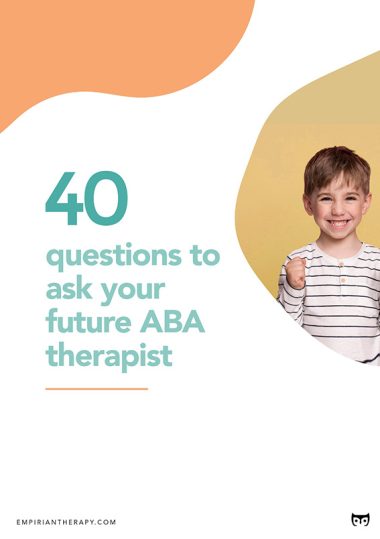So your child has just been away from school for a while, and you’re dreading that transition back to normal life.
While everyone loves vacation and breaks from school, the adjustment of returning to a structured routine after a long hiatus can be a large challenge for many children—especially those with special needs.
A lot of parents face this scenario in some form or another—whether it’s due to a personal event like a family vacation, or due to a collective experience such as a holiday break.
If your child is about to return to school after a long break, there are several things you should be aware of and take into consideration in order to help make the experience as smooth and painless as possible for everyone involved.
Why Is This an Issue?
During childhood, any significant change gets noticed and felt—whether for good or for bad. Coming back to school after a long break can pose difficult challenges for children in ways that many of us might never even realize.
Many children find the rigidity of school to be a burden and will have negative feelings about leaving a potentially more “fun” environment (such as a vacation) for a more “serious” one like the classroom.
For children with special needs, these feelings can be exacerbated even further. One of the key characteristics of autism, for example, is difficulty with transitions.
Children with other developmental disabilities, anxiety, and/or sensory sensitivities may also struggle with additional levels of difficulty with change and transitions, too.
What Needs to Be Done
First and foremost, it’s important for parents to recognize this challenge and demonstrate an awareness and interest in addressing what your child is going through.
Understanding what kinds of feelings your child might be up against is always an important first step in trying to help—and this is no exception.
With that part clear, the key to minimizing the struggle is increasing your child’s comfort level with what is going to be happening. The best way to achieve that is to make them feel aware of what to expect, which will hopefully make them feel less worried or concerned.
Every potential challenge is also a potential opportunity for learning and growth. Here is how you can take advantage of that insight, through each and every step of the returning process.
During the Time Away
The first step towards making your child’s return more comfortable is to preemptively start preparing them for it during the absence.
A few ways to do that include:
- Continue your usual behavioral support practices, and make sure that all of your child’s caregivers are on the same page
- Maintain a structured daily routine—such as a consistent wakeup time or meal time—even while away from their usual schedule
- Ensure that your child is maintaining a healthy and balanced diet
- Keep your child engaged in activities and avoid too much inactivity
- Ensure that any homework assigned for their time off is completed in a timely fashion and not postponed until the last minute
- Enforce clearly defined boundaries around their use of electronics—but not in a way that implies the child is being punished
Days Leading Up to the Return
The days immediately leading up to the return are also important, and can be an excellent opportunity for further preparation.
Consider trying things like:
- If returning from a demanding vacation or event, set a few days aside for rest so your child can mentally and physically recover
- Adjust your child back to their normal school routine (bedtime, wake up time, meal times)
- Utilize social stories to familiarize them with what they can expect upon the return to school
- Role-play different aspects of returning to school, such as getting on the bus and greeting teachers or friends
- Help your child prepare and pack their backpack with school supplies and books
- Practice your own self-care, so you can have the strength and energy to take proper care of your child’s needs—and also set a positive example for them
- Demonstrate patience and compassion, so your child does not feel any unnecessary pressure
The Night Before
As you might expect, the night before the return is crucial to setting the tone for how things will go when the big moment comes.
Hopefully, by this point, your child will be feeling reasonably comfortable and at ease thanks to your previous efforts. Nevertheless, ensuring that they’re relaxed and calm the night before will also make a big difference.
Our recommendations include:
- Let your child pick out and prepare their outfit for the morning
- If permitted by the school’s rules, help your child choose a familiar, comforting object from home that they can take with them to class
- Review the schedule and classroom expectations, including behavioral expectations, with your child before bed
- Make sure everyone gets a good night’s sleep!
Transitions can be hard—but they don’t have to be a negative experience for your child.
With a well-informed, thought out approach, there is plenty you can do as a parent to make your child feel more comfortable with returning to school—and to limit the potential challenges that can go with that.
If you have any questions about these, or any ABA-related topics, please don’t hesitate to reach out to us. We’re always happy to help!


